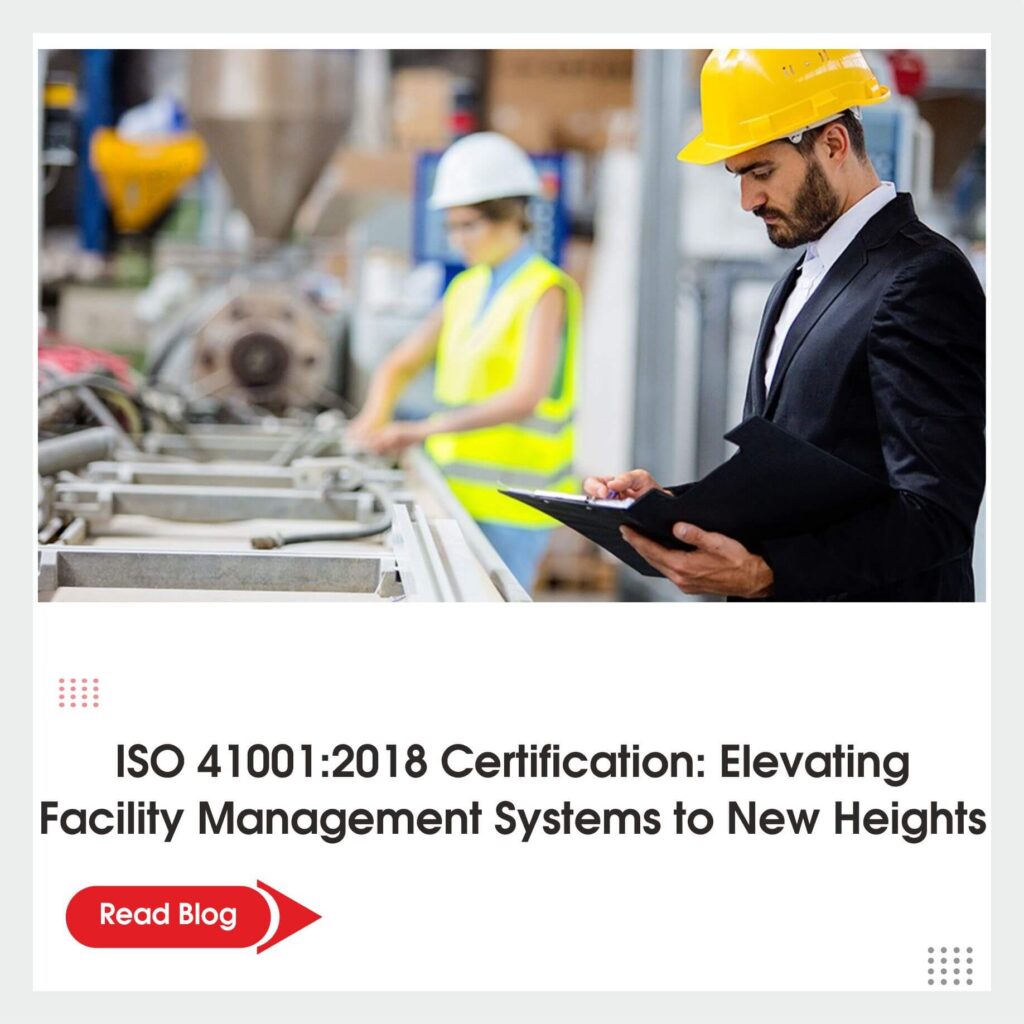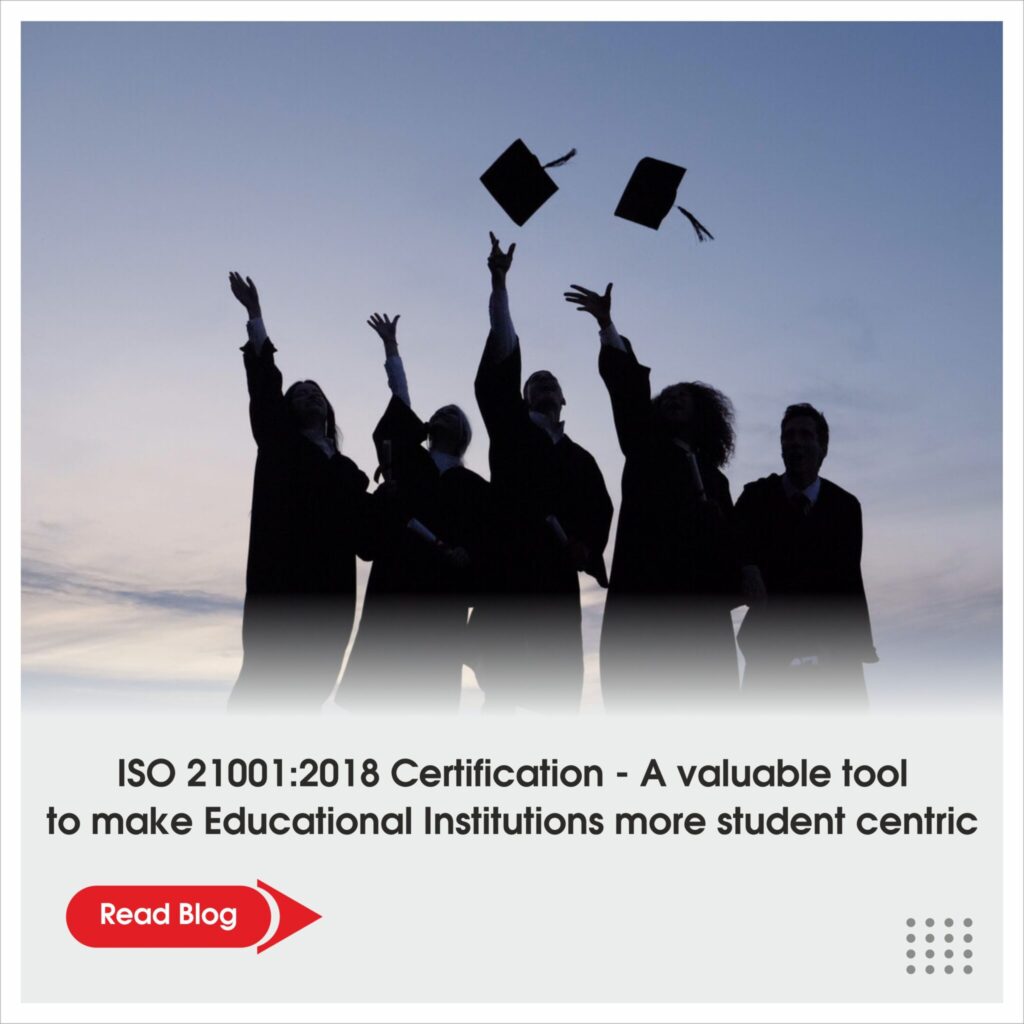ISO 41001:2018 Certification: Elevating Facility Management Systems to New Heights

The ISO 41001:2018 certification process becomes a way of ensuring efficient and effective operation of the facility management structures. This globally acknowledged benchmark serves as the touchstone of best practices in managing facilities, not only focusing on efficiency but also sustainability and safety as well. A facility manager who follows the standards of ISO 41001, shows a clear sign of being a professional who practices excellence and constantly strives to improve their operations. Through this conciliation, enterprises will be able to improve their image, simplify their processes, and fulfil the law’s requirements with maximum effectiveness. Implementing ISO 41001 standards is necessary for office management practices to take the operations up to the desired excellent level and bring satisfaction to the occupants and other stakeholders. ISO 41001:2018 facility management provides a cutting-edge stage for industries to examine whether their management systems meet the benchmark of effectiveness and affordability. Furthermore, it teaches the update of the system, the flourish of the working process, and the stick to legal rules. By implementing ISO 41001:2018, industries can assign value to their work, for instance, high-quality products and services to their clients besides increased operation efficiency and cost-reduction. It has proved to be a very useful tool for any organisation looking to excel in Global facility management such as more advanced management operations, by the scope of the industry. The use of this standard will offer numerous advantages for industrial projects, for instance, productivity and resource management will be improved, information and command will be clear, and customer satisfaction will be provided. The Steps that Need to be Taken during ISO 41001 Certification ⮯ Through the steps which are provided below, the organization will systematically acquire and retain ISO 41001 certification to indicate dedicated effort in facility management practices. Step 1: Make sure you have a good command of the ISO 41001 basic concepts. Soak up the knowledge of the ISO 41001 and the principles of the Facility Management Systems (FMS) that it articulates. See its function, limitations, and the potential utility it will bring to your company. Step 2: Develop Backing and Support Leadership buy-in of top management level to support the ISO 41001 certification implementation. It is in this way that you can favor the allocation of funds and leadership positions in the Facility Management System. Step 3: Compile a Gap Analysis Establish your baseline—compose lists that go through your operations and match them with the relevant ISO 41001 standard requirements. Enumerate activities that your company is already in line with and possible innovations that the standard may demand to comply with. Step 4: Develop a scheme. Compose a specific plan which includes exactly the series of events of your organization implementing ISO 41001 standards. Create a job description and task division to make a management structure relevant to the project, and to make it organized and hierarchical. Step 5: Generate the Set-up Standardized Procedures Display the key processes and procedures required by ISO 41001. This will comprise a manual that describes the overall FMS structure and how it is aligned with the standard. Step 6: Training and Awareness of the Workers Train employees about the new FMS procedures and point out to them how their roles in ensuring compliance are very crucial. This move will be a guarantee that all the people in the group should be aware of their roles. Step 7: Order the FMS. Integrate what has already been documented into practice. This ranges from preventive activities such as generating an FMS maintenance plan and conducting emergency evacuation drills to ensuring consistent compliance with ISO 41001 requirements. Step 8: Conduct Management Audits Do regular internal audits to find any nonconformities as well as areas that will require you to improve over time. This measure greatly helps to sustain the necessary level of compliance for certification auditing by third-party external auditors. Step 9: Corrective Actions All discrepancies or variances noted from internal audits should be resolved. Fix those issues and adopt corrective actions for the improved Facility Management System. Step 10: Select an Accredited certification Body. Choose the qualifying and certified body for outside auditing. Make sure they are acclaimed with knowledge of ISO 41001 accreditation. Initiate agreement and proper preparations for the certification audit with them. Step 11: Undergo External Certification Audit. The certification body will carry out a comprehensive audit of your FMS to check that it fulfils the standards prescribed by ISO 41001. Show the positive results of your system as well as identify any issues. Step 12: Continual Improvement After achieving ISO 41001, work systematically at improving the overall management of the organization. Routinely modify and expand your FMS to support organizational modifications and to comply with the standard. The Impact of ISO 41001 on Sustainability and Environmental Responsibility in Facility Management ⮯ ISO 41001, or the facility management system standard, is a revolutionary step, which is mainly dedicated to facilities management study. This standard is disrupting the traditional way of managing the facilities to ensure a more sustainable and environmentally friendly future for our planet as its goal is not simply to maintain, but to elevate the state of environmental responsibility and sustainability. Sustainability is one of the core aspects of ISO 41001 that encourages its adoption. This standard is stipulated to urge facility administrators to adopt the methods of sustainability that lead to reduced waste, conserved energy, and ultimately fewer green impacts brought about by the operations. As a result, waste facilities will have more energy-efficient systems and should switch to renewable energy sources whenever available and should incorporate into their programs recycling and waste reduction. The incredible influence of sustainable well-practiced practices must be emphasized. They will give back to the world, on top of that, being a long-term gain financially to the businesses. Beyond that, ISO 41001 gives a great deal of weight to the substance of nature. The operation managers are now challenged to evaluate how the decisions they make are affecting the environment in which their business operate. This is going
ISO 21001:2018 Certification – A valuable tool to make Educational Institutions more student centric

Education helps people improve their living standards while strengthening ties to the community and preparing us to contribute as valued members of society. People can learn new things, widen their perspectives, and improve their outlook on life. Education prepares students for the workplace, life, and the future by laying out clear, measurable standards. The International Organisation for Standardisation (ISO) has created the ISO 21001 Certification for educational institutions to build and enhance a more effective teaching-learning environment. What is ISO 21001:2018 Certification? ⮯ ISO 21001 Certification provides a framework for creating adaptable, transparent, and inclusive classrooms for Educational Organisation Management Systems (EOMS), which enables an organisation to offer personalised learning to satisfy the needs and expectations of each learner. A learner-centric approach is encouraged by ISO 21001 certification, which actively involves students in their education. The International Organisation for Standardisation (ISO) released it in 2018 to enable educational institutions to offer top-notch services. In addition to providing more individualised instruction for distant learners and students with special needs, it supports fair and accessible education for all. A List of Organisations that can apply for ISO 21001:2018 Certification ⮯ Any educational institution, regardless of size, type, or location, including private ones, is eligible to apply for ISO 21001 accreditation. The following is a list of companies that can apply for ISO 21001 accreditation for their Educational Organisation Management System (EOMS): Tutoring or Coaching Centres Training Institutes Special Education Schools Universities K-12 Schools Pre-schools Colleges Adult Education Centres Vocational Education Centres Benefits of ISO 21001 Certification ⮯ ISO 21001:2018 certification offers a goldmine of benefits for Educational Institutions. These are :- ISO 21001 improves the consistency of goals with policies and raises the educational institutions’ legitimacy and dependability. Educational Organisation Management Systems (EOMS) encourage personalised teaching-learning environments to ensure that all students, regardless of gender, handicap, or place of origin, can access education. ISO 21001 Certification encourages inclusive education and provides educational institutions with the means to meet the needs of all learners, including those with special needs and multilingual classrooms. Educational Institutions can maintain compliance with ISO 21001 standards to guarantee a thorough education for students. Moreover, it helps institutions exhibit their commitment to providing high-quality instruction that goes above and beyond for students. ISO 21001 Certification gives an organisation a comprehensive approach and unifies disparate regional, national, and international laws, regulations, and standards into a single framework. Educational Organisation Management Systems (EOMS) increases the social duty of educational institutions by giving everyone access to a fair, high-quality education. Conclusion ✅ The International Organisation for Standardisation (ISO) developed ISO 21001 as a global standard to provide management tools to companies that provide educational services and goods. Organisations must first compile all pertinent company information in a systematised manner to become ISO 21001 Certified. After that, organisations must document pertinent company information. Every piece of documented knowledge needs to be implemented within the company. In the next step, the organisation must prepare for internal audits. Finally, the organisation will receive the necessary ISO standard if the certifying organisation approves the management system.
